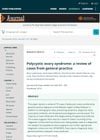TLDR The conclusion is that a more comprehensive and precise approach is needed for diagnosing PCOS to address its broader health risks.
In 2017, Francesco Orio and Giovanna Muscogiuri reviewed the diagnostic criteria for Polycystic Ovary Syndrome (PCOS), highlighting the use of three main sets of criteria: the NIH, Rotterdam, and AE-PCOS Society criteria. They pointed out the confusion caused by the broadening of diagnostic criteria, which has led to the inclusion of multiple PCOS phenotypes in studies without proper stratification. The document also emphasized the need for a more comprehensive approach to diagnosing PCOS, considering its long-term health risks beyond fertility and cosmetic concerns. The Rotterdam criteria, which have broadened the definition of PCOS, are recommended for diagnosis. The authors called for the exclusion of other disorders in the diagnostic process, the use of new biomarkers, more objective methods for assessing hirsutism, and a clear differentiation between PCOS and PCOM. They suggested using follicle number per ovary (≥25) or ovarian volume for PCOM diagnosis and stressed the importance of further research to refine diagnostic criteria and prevent associated metabolic and cardiovascular diseases.
 62 citations
,
April 2016 in “Best Practice & Research in Clinical Obstetrics & Gynaecology”
62 citations
,
April 2016 in “Best Practice & Research in Clinical Obstetrics & Gynaecology” The conclusion is that there's a need for a new conference to establish stricter guidelines for diagnosing Polycystic Ovary Syndrome (PCOS).
 467 citations
,
October 2014 in “European Journal of Endocrinology”
467 citations
,
October 2014 in “European Journal of Endocrinology” The European Society of Endocrinology advises individualized long-term management for PCOS, focusing on lifestyle changes, accurate diagnosis, and treatments for associated health risks and symptoms.
 1265 citations
,
October 2013 in “The Journal of Clinical Endocrinology and Metabolism”
1265 citations
,
October 2013 in “The Journal of Clinical Endocrinology and Metabolism” The guideline suggests using specific criteria to diagnose PCOS, recommends various treatments for its symptoms, and advises screening for related health issues.
 947 citations
,
February 2004 in “The Journal of Clinical Endocrinology and Metabolism”
947 citations
,
February 2004 in “The Journal of Clinical Endocrinology and Metabolism” Most women with excess male hormones have Polycystic Ovary Syndrome, and hormonal therapy can improve symptoms but may cause side effects.
 4025 citations
,
December 2003 in “Human Reproduction”
4025 citations
,
December 2003 in “Human Reproduction” The 2003 consensus updated PCOS diagnosis criteria and linked PCOS to higher risks of diabetes and heart problems, recommending lifestyle changes to lower these risks.
 62 citations
,
April 2016 in “Best Practice & Research in Clinical Obstetrics & Gynaecology”
62 citations
,
April 2016 in “Best Practice & Research in Clinical Obstetrics & Gynaecology” The conclusion is that there's a need for a new conference to establish stricter guidelines for diagnosing Polycystic Ovary Syndrome (PCOS).
 2 citations
,
December 2014 in “Journal of primary health care”
2 citations
,
December 2014 in “Journal of primary health care” Most women with polycystic ovary syndrome were first diagnosed by their family doctor, who may need to record symptoms better and rely less on ultrasounds.






